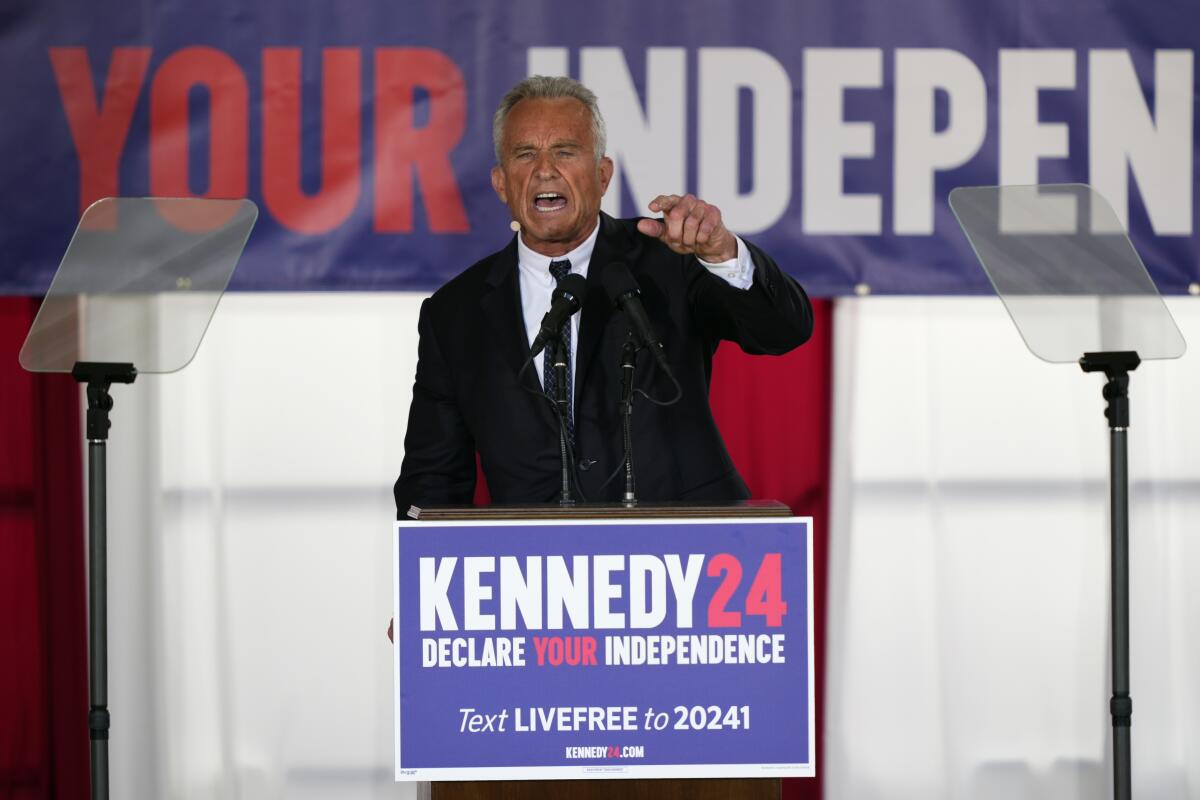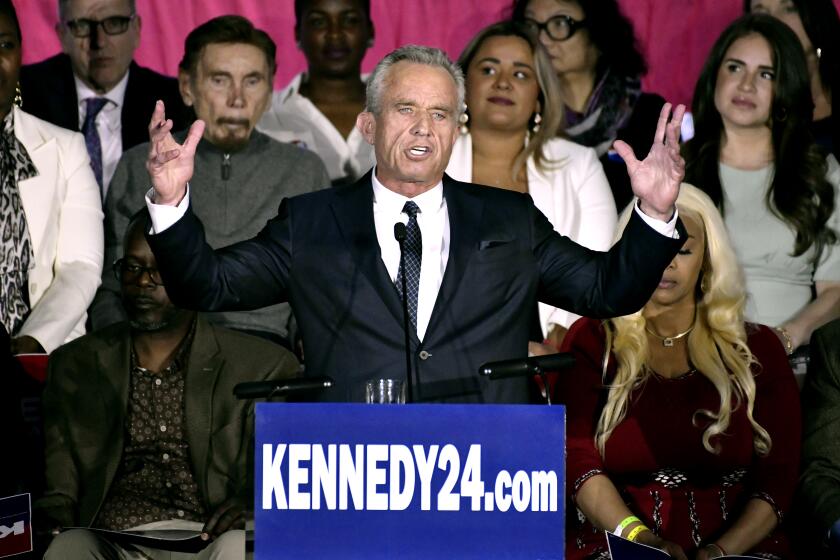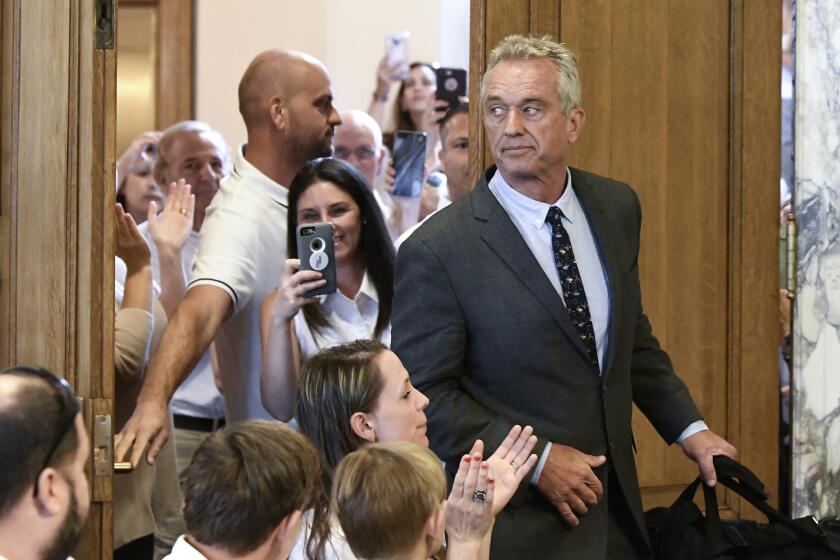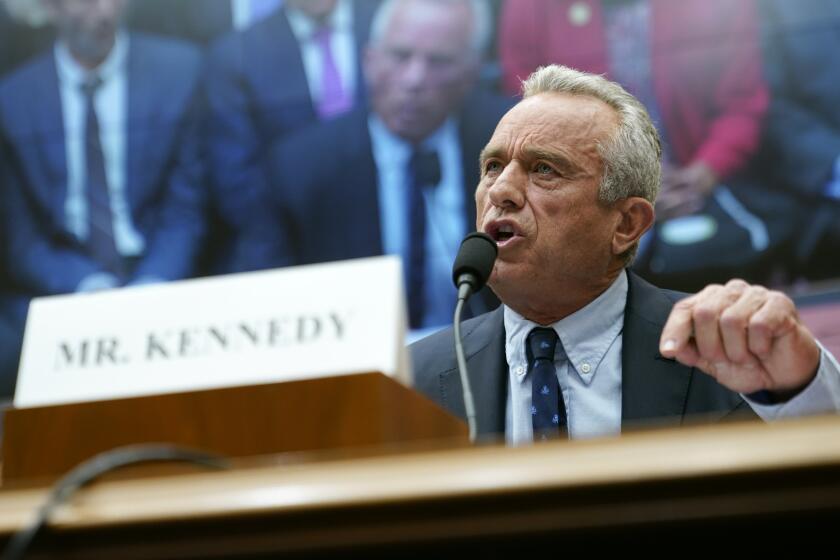Decrying ‘smug elite,’ Robert F. Kennedy Jr. to run for president as independent

- Share via
In a move that could shift the landscape of the 2024 presidential election, lawyer and anti-vaccine activist Robert F. Kennedy Jr. said on Monday that he has quit the Democratic primary and will run for president as a third-party candidate.
During a 48-minute speech in Philadelphia, Kennedy painted a dark picture of a country torn apart by corrupt elites, saying he had “declared independence” from the Democratic Party because voters deserve better than “two candidates anointed by shadowy institutions.”
“The country is sitting atop a powder keg,” Kennedy said. “Americans are angry at being left out, left behind, swindled, cheated and belittled by a smug elite that has rigged the system in its favor.”
Kennedy’s announcement caps months of friction with the Democratic National Committee, which has not scheduled any primary debates where Kennedy or self-help author Marianne Williamson, another presidential hopeful, could reach a wider audience.
Readers weigh in on whether Robert F. Kennedy Jr. should be part of presidential debates, if they are even worthwhile and what his anti-vax remarks make him.
Polling released after Kennedy launched his campaign in April showed support from as many as 1 in 5 Democratic voters, though those numbers later sagged. Some Democrats still fear that Kennedy’s candidacy, and the allure of his family name, could cloud Biden’s path to reelection.
Kennedy’s popularity remains higher with Republicans than with Democrats, according to recent polls, sparking concern among some Republican operatives that he could also be a “spoiler” for President Trump.
“The truth is, they’re both right,” Kennedy said on Monday. “My intention is to spoil it for both of them.”
Kennedy, known as Bobby or RFK Jr., is the nephew of President John F. Kennedy and the son of Robert K. Kennedy, who both were assassinated in the 1960s.
He worked as an environmental lawyer for years, fighting to clean up polluted waterways, and then founded the anti-vaccine organization Children’s Health Defense.
Children’s Health Defense has raked in funding and followers as Robert F. Kennedy Jr. used his star power.
Kennedy lives part time in Los Angeles with his wife, the “Curb Your Enthusiasm” actress Cheryl Hines, who introduced him on Monday morning.
Kennedy, 69, has tried to paint himself as a unifying force while leaning heavily on divisive and conspiratorial language, telling voters that government agencies, the media, major corporations and other institutions are lying to them. He described himself Monday as “merely the bowsprit of a ship that is going to cut through the armada of corruption, of secrecy, of lies.”
During Kennedy’s speech, four of his siblings released a statement denouncing his third-party candidacy, which they said is “dangerous to our country.”
“Bobby might share the same name as our father, but he does not share the same values, vision or judgment,” said Rory Kennedy, Kerry Kennedy, Kathleen Kennedy Townsend and former Congressman Joseph P. Kennedy II.
The Republican National Committee on Monday called Kennedy “just another far-left Democrat” who endorsed Hillary Clinton, donated to Democrats for decades and wants to end hydraulic fracturing, the controversial oil extraction method commonly known as fracking.
Kennedy defended his social media posts, which have delved into race, vaccine safety and other issues, as neither ‘racist or antisemitic.’ He said his family has long believed in the 1st Amendment right to free speech.
The committee also highlighted recent media appearances in which Kennedy has pushed conspiratorial views, including his assertion on an episode of Joe Rogan’s podcast that WiFi radiation “opens up your blood-brain barrier” and can cause cancer.
A vocal critic of mainstream media, Kennedy has relied heavily on alternative media to publicize his campaign, including podcasts hosted by Dr. Mark Hyman and the actor Russell Brand.
Kennedy has zeroed in on issues as wide-ranging as cryptocurrency, large pharmaceutical companies, agriculture and corrupt corporations, all in an effort to reach people who are already frustrated with American institutions, said Derek Beres, a co-host of the “Conspirituality” podcast, which tracks the marriage of conspiracy theories and spiritualism.
“He’s picking off all the fringe communities and speaking directly to them,” Beres said in a recent interview. “He’s an opportunist, and where he sees he can pick off a different part of the electorate, he’s going to go for it.”
Jack Dorsey, Elon Musk and other Silicon Valley tycoons are boosting RFK Jr. as a challenge to the establishment. But he is the establishment — and so are they.
Beres, a Democrat, said his chief concerns were that Kennedy would siphon enough votes from Biden to help Trump get reelected in 2024 — and that his rhetoric could make some Americans “so disaffected with the process that they end up not voting.”
That mix of voters was on display at a Kennedy campaign event in August at the Saban Theater in Beverly Hills, where elderly women in turquoise jewelry and tie-dyed T-shirts mingled with middle-aged men in tailored blazers and 20-somethings in Bitcoin T-shirts. They’d come to hear Kennedy debut a brief documentary about his visit to the U.S.-Mexico border in Yuma, Ariz.
Though border security was the topic of the day, most of the crowd was there for other reasons.
Los Angeles resident Carlene Brown, an 82-year-old practitioner of holistic medicine, said she had admired Kennedy for years because of his work with Children’s Health Defense and his vocal advocacy for holistic doctors and other anti-establishment healthcare professionals who have been “censored and silenced.”
Brown said she was raised as an evangelical Christian but left the church as an adult because she thought religion was bleeding too much into the American public school system. She still doesn’t agree with evangelical churches on much, but she allied herself with them again during the COVID-19 pandemic because “they were the ones that stood against the vaccine mandates.”
That’s just one example, Brown said, of how Kennedy “is bringing people together.”
More to Read
Get the L.A. Times Politics newsletter
Deeply reported insights into legislation, politics and policy from Sacramento, Washington and beyond. In your inbox three times per week.
You may occasionally receive promotional content from the Los Angeles Times.















